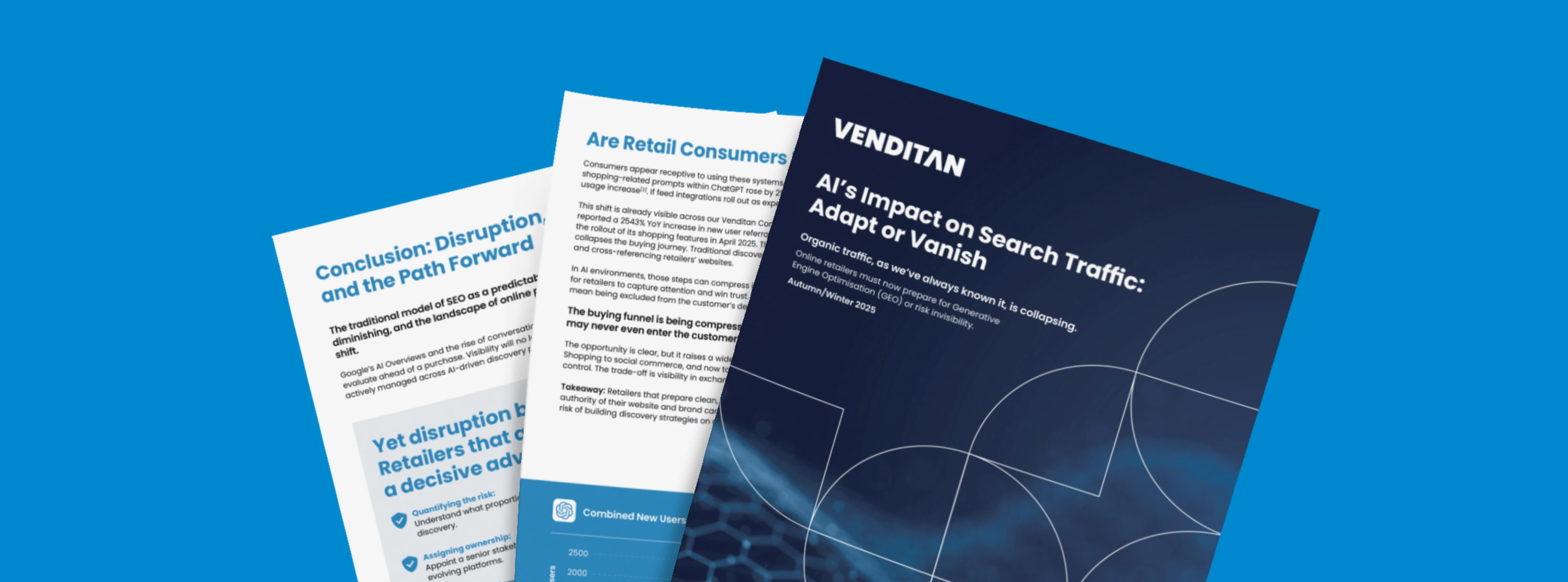Futureproofing means taking proactive steps to continuously evaluate, adapt, and plan so that a business stays relevant and thriving in the face of new trends and technology.
This is crucial for eCommerce businesses because the online market is always changing.
It's a highly competitive space with new companies entering all the time, but futureproofing helps businesses keep ready to move with the shifting needs of their customers and market.
As difficult as it is to predict what the future holds, there are measures that can be taken to ensure that an eCommerce business is prepared and adaptable. This article discusses the main ways in which this can be achieved, covering various focus points for the consideration of any eCommerce business owner.
How do you know if an eCommerce business needs future-proofing?
Whether an eCommerce business needs futureproofing involves assessing its current state and evaluating various factors that impact its long-term sustainability and growth potential.
Stagnant or declining growth over a significant period may indicate a lack of adaptation to changing market conditions, or an outdated business model. If the business struggles to keep up with these changes or capitalises on emerging opportunities, future-proofing may be necessary. Often this is brought about by intensified competition from new entrants and established players.
A decline in customer satisfaction, increasing complaints, or negative feedback can also point to issues that need addressing. Futureproofing should involve enhancing customer experiences and addressing pain points.
Outdated systems and applications are another indicator of the need for future-proofing. If existing technologies haven’t grown with the business, and are now no longer able to meet the needs of the company and customers, then this must be addressed with one eye on long-term scalability. Future-proofing efforts should be directed at optimising operations and improving overall efficiency through the use of modern technologies that reduce delays, errors and costs.
Consumers increasingly value sustainable and socially responsible businesses. If the company's practices do not align with these values, futureproofing may involve incorporating eco-friendly and socially conscious initiatives.
Further, with the rise of cyber threats and data breaches, businesses need robust and clearly communicated security measures. If an eCommerce business lacks adequate security, future proofing should include strengthening data protection practices.
There’s a lot to consider, but these are the main reasons why a business may begin to fall behind over time.

How can you future-proof an eCommerce business?
Future-proofing an eCommerce business involves working proactively to deliver progression against the factors raised above.
Continually analysing the market
An eCommerce business that keeps a close eye on its market for the latest trends and techniques is more likely to be future-proof, thanks to several key advantages that come with thinking forward.
Keeping up with the latest market trends allows the eCommerce business to identify emerging customer preferences and changing demands at an early stage. By understanding what customers are after, the business can customise its products, services, marketing strategies and experiences accordingly, ensuring that it stays relevant and attractive to its target audience.
Closely monitoring the market for new techniques and innovations empowers the business to adopt cutting-edge technologies and best practices. Implementing the latest tools and strategies can significantly boost the business's efficiency, customer experience, and overall competitiveness.
Regular market analysis helps to spot potential disruptions and threats ahead of time. By being proactive in identifying these challenges, the business can develop contingency plans and adapt its operations to mitigate risks. This level of preparedness enhances the business's resilience and ability to weather unforeseen circumstances, such as economic downturns or supply chain disruptions.
Continuously analysing the market also nurtures a culture of innovation within the organisation. It encourages employees to think creatively and come up with new ideas to meet customer needs and outperform competitors. This proactive mindset empowers the eCommerce business to drive change and seize opportunities actively, rather than merely reacting and playing catch-up with competitors.
Investing in future-proof technology
Technology plays a significant role in future-proofing.
By investing in a modern eCommerce platform that includes the systems and infrastructure necessary to streamline an operation, businesses can enhance productivity and improve customer experiences.
Efficiency, driven by automation
Modern inventory, order and customer management systems can automate various tasks, such as stock tracking, order fulfilment, purchase order management and customer engagement.
Automation streamlines operations, reduces manual errors, and improves overall efficiency, allowing the business to think further ahead and focus on strategic growth.
Advanced eCommerce platforms can also provide a seamless and user-friendly shopping experience by utilising personalisation, optimised checkout processes and innovative loyalty schemes to provide a positive customer experience and higher customer satisfaction. These are all techniques deployed to retain customers, another key to the future longevity of any eCommerce business.
Insights, driven by data
Future-proof technology often includes advanced analytics and reporting capabilities.
By leveraging data-driven insights, eCommerce businesses can gain a deeper understanding of customer behaviour, enabling them to make informed decisions for future growth by reflecting on sales trends and inventory performance.
A prime example would be using rich insights to segment the customer base dependent on their shopping behaviour. Having the ability to identify loyal, reactivated, dormant and repeat customers can be incredibly powerful as it allows the business to serve targeted material to them, resulting in a much higher conversion rate than if one blanket marketing message was communicated.
Flexible and able to support a growing business
Future-proof technology is built with flexibility in mind, enabling eCommerce businesses to adapt quickly to emerging trends and changes in customer behaviour.
This adaptability allows eCommerce businesses to stay ahead of the competition and respond promptly to market shifts, opening up new revenue streams and business models by embracing digital transformation.
It is also important that eCommerce businesses choose technology that can integrate seamlessly with their third-party tools and services.
This enables eCommerce businesses to leverage additional functionalities, such as payment gateways, shipping solutions, and marketing tools to optimise their operations - but more importantly, they have the flexibility to swap these out for other third parties quickly as new, improved solutions arrive on the market.
Regularly upgraded and supported
Reputable technology providers continually update and improve their solutions to keep pace with industry advancements.
By investing in such technology, eCommerce businesses can ensure that they will always have access to the latest features and support, even as technology evolves.
Regularly engaging with customers
Understanding the evolving needs and preferences of the customer is fundamental to the future success of any business.
eCommerce is unique in that it offers the opportunity for regular engagement with those customers, and by actively seeking feedback and conducting research, the business can identify areas for improvement and make necessary adjustments to meet customer expectations effectively. It also helps with the early detection of potential issues or challenges. By promptly addressing customer complaints or concerns, the business can prevent negative feedback from escalating and tarnishing its reputation.
Customer feedback can serve as a valuable source of insights for product and service development. Understanding what customers love or dislike about existing offerings helps with the innovation and tailoring of products and services to match market demands, enhancing the business's ability to stay ahead of the competition and deliver solutions that resonate with the target audience.
When customers feel heard and valued, they are more likely to develop a lasting relationship with the brand. Satisfied customers not only become repeat buyers but also become brand advocates, spreading positive word-of-mouth and attracting new customers through referrals.
It is also worth mentioning that a strong customer feedback loop fosters a culture of continuous improvement within the business. It encourages employees to be receptive to customer input, take ownership of customer satisfaction, and proactively seek ways to enhance the overall customer experience. Again, this customer-centric culture enables the business to adapt quickly to changing market dynamics and maintain a customer-focused mindset as it grows in the future.
Robust cybersecurity
By implementing robust security measures, such as encryption protocols, firewalls, and secure payment gateways, eCommerce businesses can instil confidence in their customers, assuring them that their personal data is safe. This trust leads to increased customer loyalty and repeat business, laying the foundation for long-term success.
Secondly, a strong cybersecurity setup helps prevent costly and damaging cyberattacks. Simply put, an eCommerce business will never be futureproof without this security in place as cyber incidents can disrupt operations, lead to financial losses, and damage the business's reputation.
By investing in advanced threat detection and prevention tools, conducting regular security audits, and ensuring staff are well-trained in cybersecurity best practices, the business can protect itself from potential financial and reputational setbacks, ensuring continuity and stability.
Companies seeking to collaborate or invest in eCommerce ventures are more likely to choose businesses with strong security measures in place. Cybersecurity is a significant consideration in business partnerships, as it directly impacts the potential risks associated with collaboration. Failure to provide evidence of such measures may harm future potential partnerships.
Develop a social responsibility
As consumers become increasingly environmentally conscious, they seek to support businesses that align with their values. Therefore, eCommerce businesses that demonstrate a commitment to social and environmental causes will be the ones that are more likely to attract and retain loyal customers in the future.
The average online retailer should consider:
- How they can begin making a positive impact in the community that they are based in.
- How they can introduce further sustainability into their product lifecycle.
- How they can communicate this information transparently and engage customers with it.
Integrating environmental consciousness into business practices can lead to operational efficiencies and cost savings. By adopting sustainable practices, such as reducing waste, optimising energy usage, and embracing eco-friendly packaging, the business can minimise its environmental impact while also reducing operational expenses. These cost savings could then contribute to the long-term financial sustainability of the business.
Businesses with a focus on environmental consciousness may be better positioned to navigate regulatory changes and anticipate shifts in consumer preferences. As governments and consumers increasingly prioritise sustainability, companies that are proactive in addressing environmental issues are less likely to face compliance challenges or customer backlash. This adaptability to changing market demands ensures the business remains relevant and resilient in the face of evolving trends.
Furthermore, demonstrating social responsibility can open doors to new business opportunities. Collaborations and partnerships with like-minded organisations and sustainable suppliers can create mutually beneficial ventures and expand the business's reach into new markets. These strategic alliances can provide a competitive advantage and fuel growth in the long term.
Becoming pandemic-proof
Considering the lessons learned from the COVID-19 pandemic, to become truly future-proof, an eCommerce business must also take proactive steps towards becoming somewhat pandemic-proof.
Pandemic-proofing involves building resilience and adaptability into the business model to navigate unforeseen challenges effectively, thus protecting the future of the business in the event of a repeat of anything close to what was experienced in 2020-2022.
Creating comprehensive contingency plans for various pandemic scenarios helps the eCommerce business respond swiftly to crises. Contingency plans should outline steps for managing supply chain disruptions, safeguarding employee health, and addressing shifts in consumer behaviour.
Relying on a single source for products or materials can leave the business vulnerable during a pandemic but by diversifying suppliers and exploring local sourcing options, the eCommerce business can mitigate supply chain disruptions and ensure a steady flow of inventory even during global crises.
Investing in the digital transformation and automation mentioned earlier in this article can help to reduce reliance on physical interactions. Implementing technologies like contactless payment, virtual consultations, and automated order fulfilment enhances the customer experience while adapting to changing norms. Cloud-based systems and digital tools facilitate seamless collaboration and customer service, ensuring business continuity.
Keep one eye on AI developments
The transformative potential of AI in the digital marketplace implores all eCommerce businesses to stay informed of the latest advancements, keeping them well-positioned to leverage any cutting-edge developments that offer a tangible business benefit.
AI-powered algorithms can analyse vast amounts of customer data to deliver personalised product recommendations and tailored marketing campaigns. By understanding individual preferences and behaviours, eCommerce businesses can enhance customer engagement and increase conversion rates. This could also be achieved through the use of AI-driven chatbots and virtual assistants, empowering eCommerce businesses to offer 24/7 customer support, and responding to inquiries instantly and efficiently.
Supply chain management, forecasting demand, and streamlining inventory management are also predicted to benefit greatly from AI in the coming years. It will help businesses to better maintain optimal stock levels, reduce costs, and ensure timely product delivery by reducing reliance on humans to analyse big data sets.
By staying aware of developing AI technology and integrating it strategically into their operations, eCommerce businesses can gain a competitive edge, improve efficiency and position themselves for long-term success in the rapidly evolving digital landscape. Ignoring AI's potential can result in falling behind competitors and missing out on valuable opportunities for growth and innovation.
Final thoughts
In conclusion, securing the future of eCommerce businesses demands strategic investments in scalable technology, fostering pandemic-proof practices, harnessing the potential of AI, and fortifying cybersecurity measures. By adopting these forward-looking strategies, businesses can confidently navigate the ever-evolving digital landscape and position themselves for sustained success in the face of uncertainty.
Our recent posts
Keep up to date with the latest news and insight from the team at Venditan
-p-2600.webp)







.webp)

